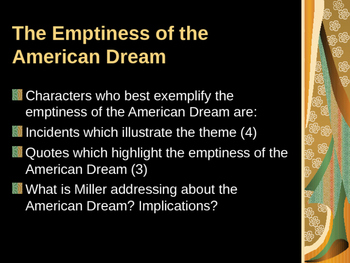

Biff is attempting to break this cycle of destruction in the family.However, they are not able to do this because of the way they have been raised. On the other hand, Biff and Happy have the opportunity to save Willy by becoming “successful” in his eyes and supporting him and Linda in their old age.In Happy’s case, he is destined to repeat Willy’s values and strive for material success, where Biff has been destroyed totally by Willy’s betrayal of the family through the affair and the fact that Willy never discouraged him from stealing.Biff and Happy are shaped by Willy’s sins.In the play, each generation has a responsibility to the other that they cannot fulfill.This blurring of reality and illusion is carried through into the structure.His aim becomes to make Willy and the family face the truth, which they have been avoiding, the truth of who they are: “The man don’t know who we are! … We never told the truth for 10 minutes in this house.” Biff is the only one who realizes how this blurring of reality has destroyed them all.


“You can’t eat the orange and throw the peel away – a man is not a piece of fruit.”.He lays Willy off when he can no longer generate money for the company, which enrages Willy: Howard’s treatment of Willy shows how destructive the pursuit of the dream can be.It is ironic then that Willy’s funeral is on the day that the Willy’s adherence to the dream means that he buys status symbols on credit that he cannot afford to keep the payments up on.Biff realizes that being true to yourself.In Willy’s mind it is also linked with being “well-liked”.However, the success that the dream aspires to is based on money and power.Is the capitalist belief that if you work hard enough you can be a success in America (the same is true for those of us living and working in Canada).


 0 kommentar(er)
0 kommentar(er)
